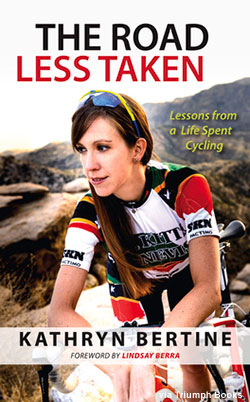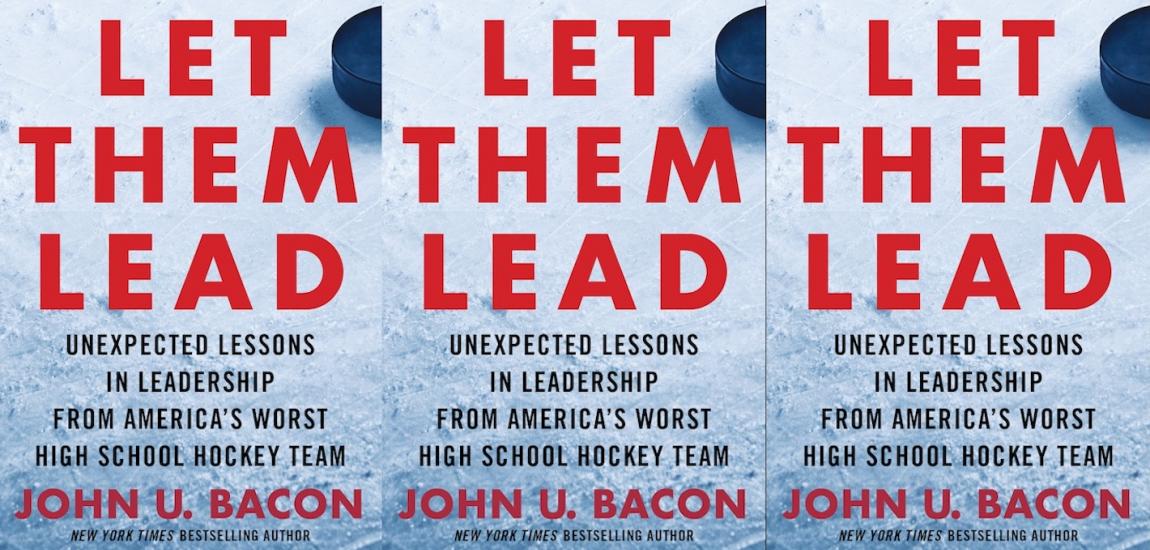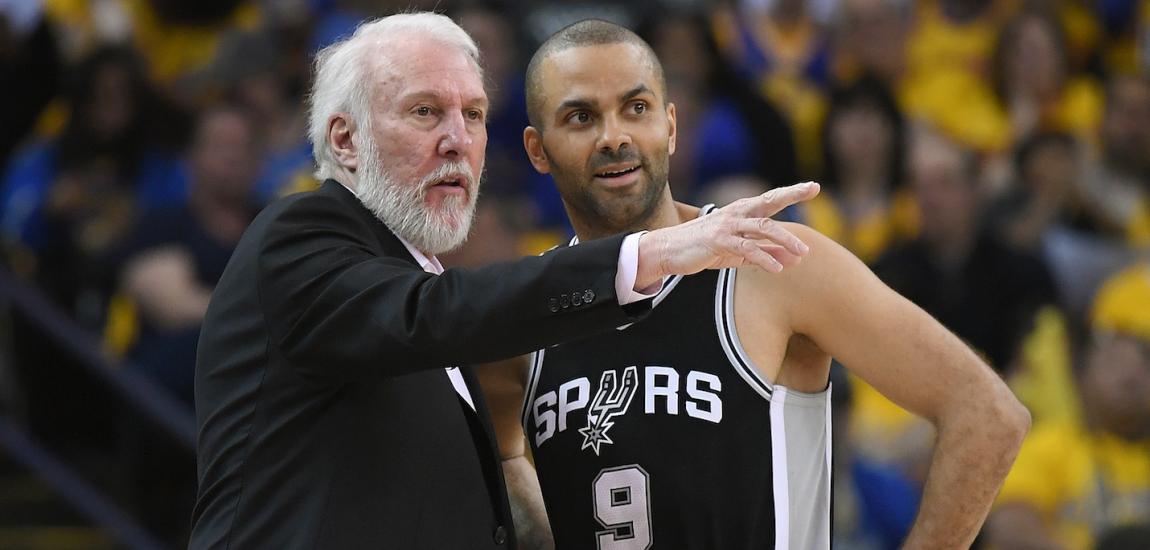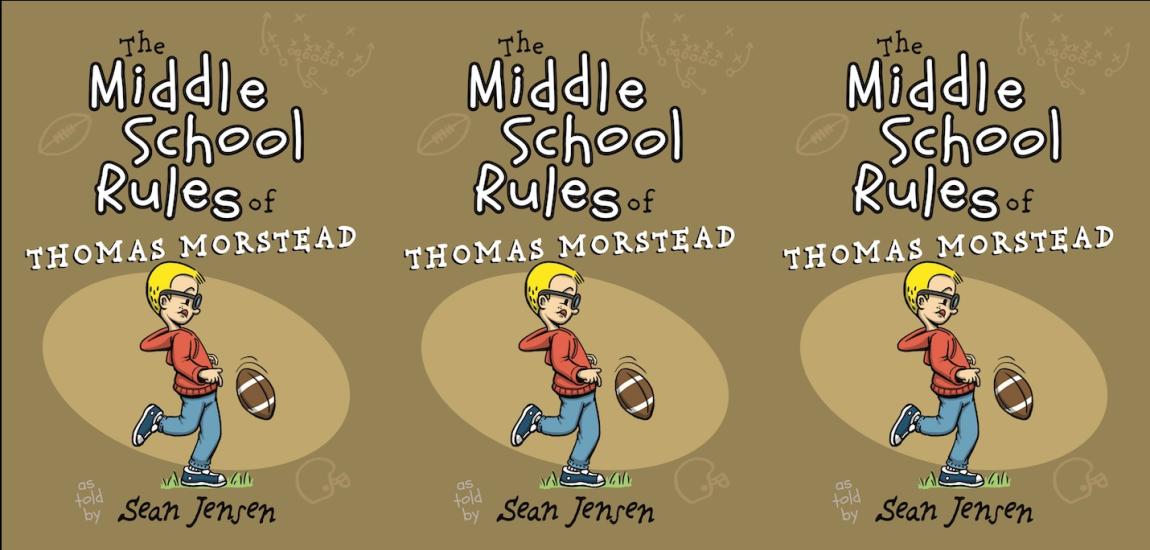In The Road Less Taken, Kathryn Bertine takes readers through her journey of striving to become a professional cyclist in her mid-30s. Her essays explore the twists and turns on life’s unexpected roads via bicycle, but also the larger meaning of what it means to heed one's inner compass and search for a personal true north. With her signature wit and humor Bertine's essays travel far beyond the bike lane, resonating with anyone who has ever dared to try and turn their dreams into a reality. Here is an excerpt:
At 18, I knew exactly where my life would be by the time I turned 28. I'd be married, have two kids, maybe three. There would be a medium-sized dog of mixed-breed heritage, pound rescued. My job within the publishing industry would be steady -- no, lucrative! -- and my income within a comfortable upper-middle-class bracket. So that's what I wrote down in the spring of 1993 when my high school history teacher, Mr. Johnson, handed each student in his senior homeroom a blank sheet of paper and asked where we saw ourselves 10 years later, when the calendar brought forth 2003.
Bil Johnson was the man. The dude. The cool teacher. The one with the ponytail, the hip wardrobe, and a passion for teaching accented with a slight, unspoken disdain for the syllabi and structures that steered students toward test-score prowess instead of an education based on truly absorbing the lessons of the world. His full name was Wilbur. I applauded his savvy commitment to being a Bil with one "l." As a Kathryn called Katie during my childhood, it made no sense that my parents chose "-ie" instead of Katy. Bil Johnson was my hero, a much-needed sign there were people in this world who got it. Despite the fact I had no idea what "it" was. This naiveté was clear, as my 10-year prediction of my life mirrored exactly the same sentiments as most of the other girls in my class. We simply used our moms as models for the question, calculating how old they'd been when we were born, where we lived in New York suburbia, and what some of our parents did for a living. I lived in the right town, went to the right school, kept myself in the right lane, and that was that. I'd surely stay in the right lane and keep making right turns.
Bil Johnson collected our letters. He said he'd mail them to us in 10 years. We snickered.
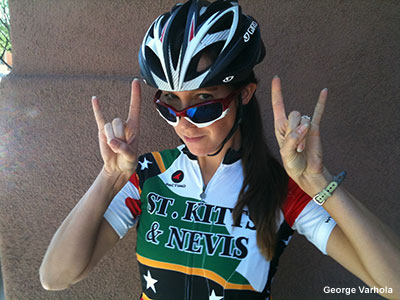
In 2003 my parents received a letter addressed to me. They had moved six years prior from the house I grew up in, but our town was small and my parents had not moved far. The postman remembered the new house and dropped the letter in their new mailbox. I, too, had moved many times since college. My parents forwarded the letter to Colorado, where I lived in a rented home with three housemates on the outskirts of Boulder. I was struggling to find work and had recently broken up with a serious boyfriend. I was 28 and batting zero for the very predictions I made about my own life. I had nothing my teenage self thought I'd have -- no husband, no kids, no dog, no salary. And yet, there was this: I was happy. I liked my life, unpredictable and oblique as it was.
There I stood, holding a letter from the past written about the future mailed by an old history teacher forcing me to contemplate the present. My first reaction was to laugh at everything from my gullibility and sentimentality to the fact I'd so assuredly written my future in pencil. As the letter lingered in my thoughts, which was surely what Bil Johnson intended, my feelings turned inward and one question drifted to the forefront. Though I was happy, I was struggling. Is it okay that I've veered so far off course? To miss the right-turn lane? To have amassed nothing from the realms of my own projected normalcy? It would take another decade to formally decide on such answers.
Now, at 38, I know the answer to veering from the path of normalcy is yes, it is okay. Not only is it okay to take the road less traveled, but it's the one we're supposed to take if we're lucky enough to see a divergence. I don't think this alternative path shows itself to everyone, and that is also okay. But for those of us who do see it, or want to see it, the road shows up for a reason. Not necessarily a spiritual "reason" as I'm not likening this road to a religious or universal belief, nor can I attest that this reason is a biological impulse. Reason itself may be none or all of those things, but I do believe we're all born with an internal What-If whisper. Some of us just hear it louder than others. For this reason, I've never thought that Robert Frost actually chose between the two roads in his famous poem, "The Road Not Taken." Sure, he saw two roads and looked at them both. He admits they were both pretty equal. Then he took one. Yet in using the word "take" instead of "choose," I've always felt as if Frost possessed that What-If whisper, the one that says, "Come on, Bob. This really isn't a choice. You know you're supposed to take that path on the left. So get on it."[1]
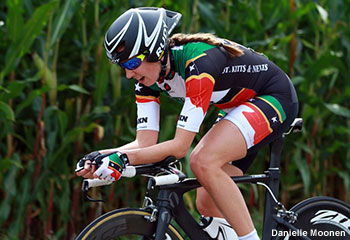
My whispers, paths, and What-Ifs led me far from the predictions of an 18-year-old girl who had yet to understand the gorgeous, gnarled maps of Maybe that would soon unfurl their atlas within me.
As a child, I fell in love with sports. Only as any athlete knows, sport itself isn't so much the draw as the energy, will, and passion it brings out within us. In high school I ran cross country because I was drawn to the hunt of chasing down my competition, and I came to respect this primordial lesson of persistence. In college I rowed, engulfed by the physical understanding of harmony and unison and balance, and how life seemed most perfect when surrounded by those who also treasured such measurements of joy. After college, I took a road most definitely less traveled and signed on for a year of professional figure skating with companies like Ice Capades, Holiday on Ice, and Hollywood on Ice. Skating was my first true love, a sport that above all else taught me the greatest lesson sport can teach: how to be yourself. Skating was, at its most basic element, a literal exercise in carving one's own path. Yet on the professional tour, I got lost. The path became unclear, my life map suddenly blurred by warring territories where hopes and dreams fought desperately to cross into the borders of reality. What was once a dream to skate with the best disintegrated into the veracity of a second-rate tour of former athletes who had little respect for their bodies, or much else. I struggled then, as the epicenter of an athlete's code -- to never give up -- clashed terribly with the idea that it's okay to look for a new path when the one we're on becomes a dead end. Years removed from the skating tour, I never regret the decision to take that road. It was a road as right as it was wrong, for any journey that unhinges the control panel of our soul and lets us take a hard look at our own wiring is ultimately a worthwhile quest.[2]
I found the right path after my skating tour, which took me to graduate school in Tucson, Arizona. Without skating, I heeded my body's call to find a new sport and joined the world of triathlon. The swimming, biking, and running dug their hooks into me, and I worked all the odd jobs that allowed me to put sport and writing first. I stayed on the triathlon road for nine years, traveling past my 30th birthday, winding around a couple of tumultuous relationships into the professional realms of racing and publishing my first memoir, All the Sundays Yet to Come, moving myself from Tucson to Boulder to the East Coast and back to Tucson again, stumbling off path a few times but somehow knowing that the stumbles were supposed to be part of the trip. When it comes to the road less traveled, "stumble" is code for "lesson." Of course, some lessons don't always feel so great during the learning process. There were many times where, in the midst of a life lesson, I wanted nothing more than to cut class. Then in the clamorous core of one rather large life tutorial, I stumbled upon a most unbelievable path.
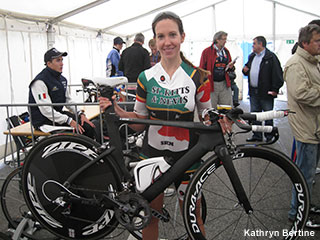
During my freelance career, which somewhat sustained me through the paltry and often nonexistent paychecks of women's professional sports, I'd done a fair bit of work for ESPN The Magazine. In 2006, the company approached me to write an online column called "So You Wanna Be an Olympian?" about what it actually takes to get to the modern day Olympic Games. The 2008 Beijing Summer Games were just two years away, and my job was to do whatever it took to qualify. In any sport possible. (I tried a handful of fascinating sports and eventually chose to pursue road cycling.) The ESPN call came at the most interesting time, as I was reeling from my broken engagement to Mr. Wrong Path. At the time, my chosen road was jagged and wobbly and felt as if I were trying to traverse the Himalayas in flip flops. Unexpectedly, ESPN parachuted in and pointed the way. For two and a half years, I embarked on the most incredible, life-altering journey that merged my two passions of sport and writing. As Good As Gold was published, chronicling the adventure.
And then, as all things do in the world of publishing and contracted assignments, my road ended. The 2008 Olympics came and went, the book hit the shelves in 2010, the column was finished, and that should have been that in regard to my cycling adventure. Yet something uncharacteristic happened during that Olympic journey. I completely forgot to turn right. Or left. I ended up in the bike lane, kept going straight, and fell deeply in love with road cycling. We began a serious relationship. Every lesson I ever learned in skating, rowing, running, and triathlon found the ultimate classroom in cycling. I was 33 years old in 2008 when the new What-If whispered, "What if you could ride all the way to the professional ranks?"
I knew exactly what I was up against, physically and emotionally. Roads less taken are terrific in many regards but hardly synonymous with continuity or ease. I learned that struggle most often arrives under two circumstances: when we can't see our path, or when we choose to stray from the one we're truly meant to follow. No path is clear the whole time; there is rarely smooth pavement along the road less traveled. That would be a given. This new goal of cycling toward the pro ranks would bring victory and devastation, difficulty and enlightenment, and yet another detour from the predictions of a life most traveled. I thought of Bil Johnson and how my high school letter of life prediction would probably never come true at this rate, but there on the scroll of old memories and new hopes running through my mind, I was sure I could see him smiling in approval. When the What-If first breathed the idea of racing professionally into me, I knew the goal had little to do with cycling and everything to do with trying. Trying was -- and is -- my true north, regardless of destination. It has taken 20 years for this realization to surface and solidify. But I now know I am supposed to live a life of peaks and valleys, and while I often yearn for the ease of flatter ground, I am happiest while climbing.
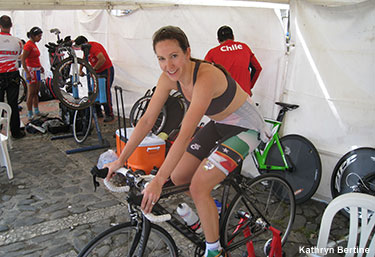
I also understood that this professional cycling goal wasn't a journey of sport but a further expedition of a life less ordinary. One that would chronicle five years of my mid-thirties, no less. Who, at 33, chooses bicycles over babies? Highways over husbands? Carbon fiber over fortuitous careers? No one, surely. That is, no one chooses. It is simply who we are to heed our What-Ifs. And the call of the What-If is hardly specific to athletes.
As a writer, it is my belief that sport is just a metaphor no different than any other literary conceit, from mystery and fantasy to love and war. Corporate publishing would disagree. The idea of life lessons learned by a woman on a bicycle means such a book will probably end up on the sports shelf, smushed in with the heroes and how-tos of athleticism, though I wrote it not for athletes but for anyone who has ever had the simplest desire to try something different in their own life. I wrote it for that guy in the cubicle who keeps checking out that webpage about volunteering in Africa. For the waitress wondering about med school. For the mom with three kids who hears that whisper of starting her own company. For the senior citizen tired of the same old, same old, and curious about the brand new, brand new. For the teenager who knows exactly where she'll be in 10 years, and for the 48-year-old who's still searching. And of course, I wrote this for the Bil Johnsons of the world, who send mirrors masked as letters and use words to help us take a look at ourselves.
I may have used a bicycle to find my road less taken, but it was merely the vehicle for a voyage rather than the voyage itself. Most of these pages are about life off the bicycle—all the things I learned while answering the What-Ifs, while I went to find my path. For months, I wracked brains, books, and essays for a scholarly close to this introduction. Surely Plato or Wordsworth or Emerson or Dickens could best express what I wanted to emote, give that one final nugget of guidance and truth about heeding What-Ifs and mustering the tenacity to seek one's true path. Instead, I found my closing inspiration in the most unlikely source -- an old Pee-wee Herman movie being broadcast on a third-rate cable network that I surfed past while eating lunch after a long winter-training ride. Just before Pee-wee sets out for his Big Adventure in the silliest of his '80s movies, Herman proclaims with simplistic resolve:
"I'm going to find my bike."
Eventually, he does. May you find yours.
-- Excerpted by permission from The Road Less Taken by Kathryn Bertine. Copyright (c) 2014 by Kathryn Bertine. Published by Triumph Books. All rights reserved. No part of this excerpt may be reproduced or reprinted without permission in writing from the publisher. Available for purchase from the publisher, Amazon and Barnes & Noble. Follow Kathryn Bertine on Twitter @kathrynbertine and @halftheroad.

